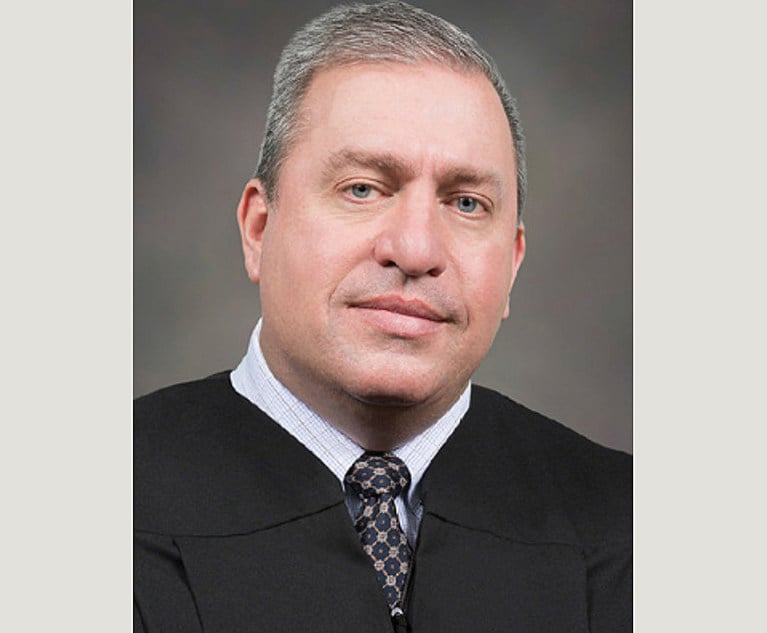Phila. Attorneys Question Meek Mill Legal Team's Brash Tactics
The decision of embattled Philadelphia rapper Meek Mill's lawyer to publicly criticize the judge handling his client's long-running case is certainly a bold, and brash, legal strategy, but one that has left many local attorneys scratching their heads.
November 16, 2017 at 04:52 PM
9 minute read

The decision of embattled Philadelphia rapper Meek Mill's lawyer to publicly criticize the judge handling his client's long-running case is certainly a bold, and brash, legal strategy, but one that has left many local attorneys scratching their heads.
Philadelphia Court of Common Pleas Judge Genece Brinkley last week sentenced the hip-hop star, whose real name is Robert Williams, to two to four years of incarceration after violating his probation. Williams, who has been on probation since 2008, was arrested twice this year.
The sentence came as a surprise because neither the prosecutor, nor Williams' probation officer, had asked for prison time. However, the bigger surprise came the next day, when New York attorney Joe Tacopina, one of the rapper's lawyers, made statements to the press that Brinkley had imposed the harsh sentence because she was “enamored” with Williams and had acted inappropriately in handling the case.
Tacopina's allegations were quickly picked up in publications across the country, and by Nov. 13, New York Post's Page Six gossip column was reporting that, according to a source, the FBI had been investigating Brinkley in connection with the Meek Mill case for more than a year.
That story quickly made national headlines too, but local attorneys remain skeptical about much of what has appeared in the national press, and questioned whether Tacopina's decision to publicly criticize the judge may end up doing more harm than good for Williams.
The most eye-catching allegations that Tacopina made were that Brinkley told Williams he should switch managers, from the New York-based Roc Nation back to his previous manager, Philadelphia-based Charlie Mack. Tacopina also said Brinkley had asked Mill to record a version of the Boyz II Men song “On Bended Knee” that included a specific reference to her in the song.
Those allegations were made a part of the official record Nov. 14 when Brian McMonagle, who is also representing Williams and previously represented Bill Cosby, filed a motion asking Brinkley to recuse.
Criminal defense attorneys who have appeared before Brinkley described her as a very fair judge. William J. Brennan, who said he has appeared in front of Brinkley numerous times, said she is “tough but fair.” A. Charles Peruto Jr., who said he has known Brinkley for 30 years, agreed.
“If every judge in the system were Genece Brinkley, I'd be happy,” he said.
Defense attorneys also said Brinkley was well within her discretion to give Williams a prison sentence, especially if she felt he had been previously thumbing his nose at the court.
The decision to publicly allege she is infatuated with Williams could likely also hurt the rapper's chances to have the sentence overturned, Peruto said.
“It's an absolutely incorrect approach. I don't care if you appeal it to heaven, it won't get reversed,” Peruto said. “Anybody who claims to be on Meek Mill's side and gives an interview like that seems ready to have a nervous breakdown it is so foolish.”
Steven Fairlie, a criminal defense attorney with Fairlie & Lippy in North Wales, said it's unclear whether Tacopina's comments in the press were calculated or off-the-cuff.
“I don't know if that was a strategy or a knee-jerk reaction out of frustration,” Fairlie said, adding, “Meek Mill has surrounded himself with people who work for him and who want his approval and they express their displeasure” when things don't go his way.
Fairlie said it would be highly unlikely to see a Philadelphia attorney make those sorts of allegations in the press against a judge they appear before regularly, but it's less surprising coming from an attorney whose practice is primarily based in New York—particularly one with a celebrity client.
“I don't know this, but one could speculate that there could be a business motive here,” Fairlie said. “Certainly, this doesn't hurt the sales of Meek Mill's music. He's getting a lot of press out of this.”
But Tacopina, in an interview Thursday, fired back at suggestions that his decision to speak to the press about Brinkley was impulsive.
“We don't have knee-jerk reactions,” he said, noting that he discussed with his co-counsel the decision to go public with the allegations against Brinkley before he conducted any press interviews. “There's nothing we do that's a knee-jerk reaction. That's amateurish. I've been around the block as both a prosecutor and a defense lawyer for a long time.”
According to Tacopina, the public was shocked and confused by the sentence and Williams' legal team felt it had a duty to reveal Brinkley's alleged conduct leading up to it.
“We felt it was so outrageous that we had to explain what happened,” he said.
Tacopina also waved off the notion that those interviews were intended as a marketing tool for his client.
“Meek didn't need any help right now. He's the No. 1 rap artist in the country right now,” Tacopina said, adding that his client would gladly trade a prison sentence for a little less press exposure.
If anything, Tacopina said, Williams' prison sentence “could potentially derail” the momentum of his career.
While Fairlie was skeptical of Tacopina's approach, he was less critical than others about Williams' attorneys' in-court strategy, noting that waiting until after Brinkley handed down the sentence to file a recusal motion was sensible in a number of ways.
“You want to file it as timely as possible. However, I think part of their argument in this case would be that the perceived bias wasn't perceived until the sentence was pronounced,” Fairlie said. ”Why would you file a recusal motion when you think you're just going through a rote process? The DA's recommending probation, the probation officer is recommending probation. They may have been expecting the judge to rubber stamp that recommendation and they didn't get it.”
And that wasn't an unreasonable expectation, Fairlie said.
“The odds are substantially in favor of getting a sentence that the prosecution and the probation officer and the defense attorney are in agreement on,” he said. “I can't second-guess defense counsel, the odds are so high.”
Those considerations are all part of the gamble defense lawyers make when deciding whether to file a recusal motion, he said.
“I could see a possible basis for recusal and keep my mouth shut because I think that judge is good for my case,” Fairlie said. “I'd want to get my client's approval. I don't think you can do something like that without bringing your client into the loop.”
Williams' attorneys made what seemed like a safe bet that the judge would render a favorable sentence, but even though that didn't happen, they can still make the recusal argument on appeal, Fairlie said.
“If you look at it in the Meek Mill case, you could really get two bites at the apple,” he said, though he did acknowledge that filing a recusal motion after sentencing regarding issues counsel was aware of prior to sentencing does weaken that argument.
Tacopina confirmed that one of the reasons his team decided not to seek recusal as soon as Brinkley allegedly made inappropriate requests to Williams is that, until the prison sentence was handed down, Brinkley never acted in a way that could be viewed as retaliation for Mill's refusal of those requests.
“She's monitoring his probation,” Tacopina said. “It's difficult for him to run right away to recusal when she hasn't done anything to negatively impact [his case].”
Tacopina also acknowledged that the true purpose of the recusal motion is to preserve the issue for appeal.
“If [Brinkley] were honest with herself she would grant the recusal motion, but we don't expect that at all,” he said. “We have to make [the motion] to appeal it later.”
However, when it comes to substantiating the claims in that motion, attorneys said they see hurdles.
The recusal motion further outlined the allegations Tacopina has made in the press. With regard to Brinkley's allegedly inappropriate remarks that Williams change managers, the filing cited portions of several transcripts. However, when it came to the allegation that Brinkley asked Mill to add her name into the lyrics of the Boyz II Men song “On Bended Knee,” the motion did not refer to any transcript.
Instead, the motion said Williams and fellow performer Nicki Minaj, who appeared to be the only other person in the room when the request was made, could testify to the alleged conversation if necessary, and, in a footnote, added that Mills' “prior attorney did not object to Judge Brinkley's request that this discussion occur, that it be held in camera, that it be uncounseled, or that it be entirely off-the-record.”
Buchanan Ingersoll & Rooney attorney Thomas Bergstrom said putting anything in a motion without a supporting transcript is risky.
“If you're going to make an allegation that a judge is biased, you better have a really strong reason for it, and you better have the underlying documentation to support that motion,” he said. “I know one thing, if there's no record of it, I wouldn't include it.”
Several attorneys also said they were very skeptical of the New York Post report that the FBI is investigating Brinkley in relation to the Meek Mill case, with many saying the allegations by Mill's counsel did not appear to raise issues that would pique the interest of federal investigators.
“If the FBI gets involved in this case, I will retire from practicing law and donate my earnings over the last 10 years to whatever charity you like,” Peruto said.
Tacopina declined to comment on whether he's been contacted by the FBI or whether he's aware of an ongoing criminal investigation into Brinkley, but said the existence of a criminal probe would have been a factor weighing against filing a recusal motion when Brinkley's alleged conduct first came to light.
“While I cannot comment one way or another on any law enforcement investigations, if there were a law enforcement investigation, it would be difficult to make a motion at that point,” he said.
He did say that his team plans to file an ethics complaint against Brinkley with the Judicial Conduct Board.
McMonagle did not respond to requests for comment.
A spokesman for the Philadelphia Court of Common Pleas declined to comment because the matter could become the subject of future litigation.
A spokeswoman for the FBI said it can neither confirm nor deny the existence of investigations.
This content has been archived. It is available through our partners, LexisNexis® and Bloomberg Law.
To view this content, please continue to their sites.
Not a Lexis Subscriber?
Subscribe Now
Not a Bloomberg Law Subscriber?
Subscribe Now
NOT FOR REPRINT
© 2024 ALM Global, LLC, All Rights Reserved. Request academic re-use from www.copyright.com. All other uses, submit a request to [email protected]. For more information visit Asset & Logo Licensing.
You Might Like
View All
Pa. High Court to Weigh Parent Company's Liability for Dissolved Subsidiary's Conduct
3 minute read
Pa. Supreme Court Taps New Philadelphia Family Division Administrative Judge
3 minute read
People in the News—Nov. 27, 2024—Flaster Greenberg, Tucker Arensberg
3 minute read
Trending Stories
Who Got The Work
Michael G. Bongiorno, Andrew Scott Dulberg and Elizabeth E. Driscoll from Wilmer Cutler Pickering Hale and Dorr have stepped in to represent Symbotic Inc., an A.I.-enabled technology platform that focuses on increasing supply chain efficiency, and other defendants in a pending shareholder derivative lawsuit. The case, filed Oct. 2 in Massachusetts District Court by the Brown Law Firm on behalf of Stephen Austen, accuses certain officers and directors of misleading investors in regard to Symbotic's potential for margin growth by failing to disclose that the company was not equipped to timely deploy its systems or manage expenses through project delays. The case, assigned to U.S. District Judge Nathaniel M. Gorton, is 1:24-cv-12522, Austen v. Cohen et al.
Who Got The Work
Edmund Polubinski and Marie Killmond of Davis Polk & Wardwell have entered appearances for data platform software development company MongoDB and other defendants in a pending shareholder derivative lawsuit. The action, filed Oct. 7 in New York Southern District Court by the Brown Law Firm, accuses the company's directors and/or officers of falsely expressing confidence in the company’s restructuring of its sales incentive plan and downplaying the severity of decreases in its upfront commitments. The case is 1:24-cv-07594, Roy v. Ittycheria et al.
Who Got The Work
Amy O. Bruchs and Kurt F. Ellison of Michael Best & Friedrich have entered appearances for Epic Systems Corp. in a pending employment discrimination lawsuit. The suit was filed Sept. 7 in Wisconsin Western District Court by Levine Eisberner LLC and Siri & Glimstad on behalf of a project manager who claims that he was wrongfully terminated after applying for a religious exemption to the defendant's COVID-19 vaccine mandate. The case, assigned to U.S. Magistrate Judge Anita Marie Boor, is 3:24-cv-00630, Secker, Nathan v. Epic Systems Corporation.
Who Got The Work
David X. Sullivan, Thomas J. Finn and Gregory A. Hall from McCarter & English have entered appearances for Sunrun Installation Services in a pending civil rights lawsuit. The complaint was filed Sept. 4 in Connecticut District Court by attorney Robert M. Berke on behalf of former employee George Edward Steins, who was arrested and charged with employing an unregistered home improvement salesperson. The complaint alleges that had Sunrun informed the Connecticut Department of Consumer Protection that the plaintiff's employment had ended in 2017 and that he no longer held Sunrun's home improvement contractor license, he would not have been hit with charges, which were dismissed in May 2024. The case, assigned to U.S. District Judge Jeffrey A. Meyer, is 3:24-cv-01423, Steins v. Sunrun, Inc. et al.
Who Got The Work
Greenberg Traurig shareholder Joshua L. Raskin has entered an appearance for boohoo.com UK Ltd. in a pending patent infringement lawsuit. The suit, filed Sept. 3 in Texas Eastern District Court by Rozier Hardt McDonough on behalf of Alto Dynamics, asserts five patents related to an online shopping platform. The case, assigned to U.S. District Judge Rodney Gilstrap, is 2:24-cv-00719, Alto Dynamics, LLC v. boohoo.com UK Limited.
Featured Firms
Law Offices of Gary Martin Hays & Associates, P.C.
(470) 294-1674
Law Offices of Mark E. Salomone
(857) 444-6468
Smith & Hassler
(713) 739-1250





